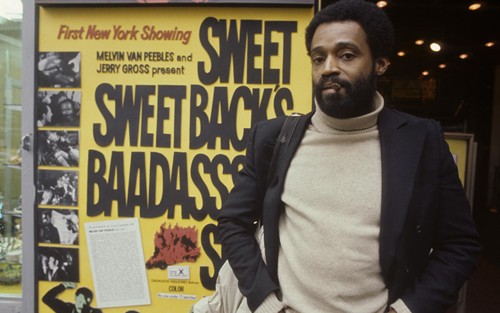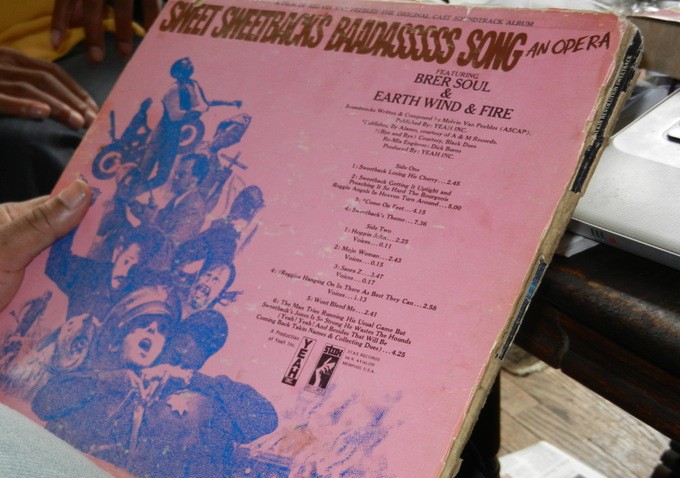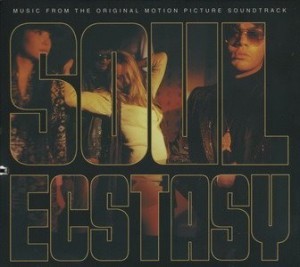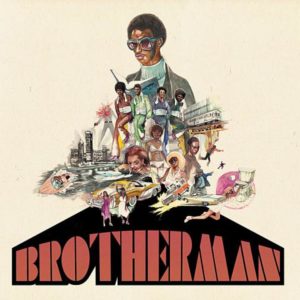According to Shadow & Act, Sweet Sweetback’s Baadasssss Song – A Hood Opera is coming to New York sometime in 2013.
Sweet Sweetback’s Baadasssss Song – A Hood Opera made it’s debut in France in 2010 as a part of the a Sons d’hiver festival. As noted by Shadow and Act, learned during their conversation with Van Peebles, Sweet Sweetback’s Baadasssss Song was always meant to be an opera. They took the photo above, the original album cover for Sweetback, during their meeting.
[line-sep]
Caught In The Act – Brooklyn Independent Television
In 1971, Melvin Van Peebles directed and starred in one of the classics of African-American film. Now, with the group Burnt Sugar and a cast of more than a dozen, he workshops a new stage version, filled with Baadasssss songs. From Brooklyn Independent Television’s Caught In the Act, episode 22. Original airdate: 1/27/2010
[line-sep]
New York Times
January 24, 2010
He’s Got It Bad, or ‘Baad,’ for His Art
By BEN SISARIO
ASK Melvin Van Peebles about his legacy, and you get a snort, a grimace, a wave of the hand, a game-show error buzz and a finely punctuated “come on.”
“I didn’t even know I had a legacy,” he said between rehearsals for his latest project, a musical-theater adaptation of his 1971 film “Sweet Sweetback’s Baadasssss Song.” “I do what I want to do.”
But his reputation is formidable. As the writer, director and star of “Sweetback,” he is a godfather of black cinema. His stage musical “Ain’t Supposed to Die a Natural Death,” also from 1971, brought unsparingly gritty portraits of black urban life to Broadway. He is a novelist, a composer, an entrepreneur, a veteran of both 1960s Paris and 1980s Wall Street. “He is a great example of an American artist who has never stopped pushing himself or others,” the cultural critic Nelson George said.
“Sweetback,” which grossed more than $10 million, broke every rule in Hollywood, and its story of a black man who successfully resists white authority shocked and exhilarated audiences. Now 77, Mr. Van Peebles is still a gadfly and an outsider. In 2004 he revived “Ain’t Supposed to Die” with the Classical Theater of Harlem, and in 2008 he made “Confessions of a Ex-Doofus-Itchy Footed Mutha,” a “Sweetback”-like picaresque that some critics have praised for its gumption, if nothing else. Next month his “Sweetback” adaptation opens at the Sons d’Hiver Festival in and around Paris, with workshop performances on Feb. 3 and 4 at BRICstudio in Brooklyn.
In person Mr. Van Peebles is a throwback to the era of Afros and revolutionary rhetoric. His beard has gone ash white, but he still sports black leather vests and pants, purple-shaded glasses and vintage high-tops. He is rarely without a soggy cigar — occasionally lighted — or a bellicose zinger, like: “If somebody messes with me, it’s not a lecture they need. It’s a brick.”
“I want people to be empowered and also have a damn good time,” he said in a recent interview at his compact apartment in Midtown while proofreading “Sweetback” revisions and fielding calls from his book publisher and DVD distributor. His young assistant waited next door, in a space that Mr. Van Peebles has turned into a gallery of his own whimsical artwork, like “Ex-Voto Monochrome (A Ghetto Mother’s Prayer),” a painting with angelic wings attached to the frame.
“The key to empowerment is no more complicated than what Jesse Jackson said: We are somebody,” he continued, referring to “I am somebody,” Mr. Jackson’s chant of self-respect, most famously led at the Wattstax concert in Los Angeles in 1972. “But the ‘We are somebody’ I would like to be in the larger sense, not just the urban African-American but homo sapiens in general: We are somebody.”
Yet it’s a long way from the early 1970s, when the Black Panthers endorsed “Sweetback,” and The New York Times called Mr. Van Peebles “the first black man in show business to beat the white man at his own game.” A black man is now president. And the blaxploitation genre that briefly flowered after “Sweetback” (“Shaft,” “Cleopatra Jones,” etc.) rendered many of Mr. Van Peebles’s innovations ripe for parody: a jive-talking outlaw hero, declarations of war against “the man.”
All of this has only strengthened Mr. Van Peebles’s resolve as artist and provocateur, and his new “Sweetback” adapts to the present while standing as a defiant reminder of everything that should have changed but hasn’t. Some of his alterations are surgical. He identified 17 minutes 20 seconds of action that required rewriting, and worked with Burnt Sugar, an experimental jazz-funk band, to expand the original score.
At a reading of the script at the Apollo Theater last year Mr. Van Peebles found that at points “some of the younger people were slightly adrift.” The problem wasn’t the dated slang, he said, but situations of racial conflict and discrimination, which 1970s audiences had understood instinctively. So Mr. Van Peebles added scenes to give necessary context. For example, a scuffle between the police and some militants — brief and obliquely shot in the film — is now a full street rally, with a speech about struggling in vain for a slice of “that sweet old utopian American apple pie.”
Much like his work Mr. Van Peebles’s life is a study in the contrasts between ambitious art and the brutal realities of race in America. The son of a Chicago tailor, he joined the R.O.T.C. and went to Ohio Wesleyan University, and after graduating in 1953 with a degree in literature, he entered the Air Force. “When I was in the Air Force,” he recalled, “if I walked into a restaurant, in about eight or nine minutes the M.P.’s would show up and drag me out because someone had called, saying that someone was impersonating an officer.”
His post-Air Force adventures took him eventually to Paris, where he wrote five novels and made a feature film, “The Story of a Three Day Pass” (1968), that got him noticed by Hollywood. He signed with Columbia and made “Watermelon Man” (1970), about a white bigot’s metamorphosis into a black man, but his tussles with the studio over creative control led him to a lifetime of stubborn independence.
“Sweetback” is the story of a Los Angeles ladies’ man who becomes a fugitive after attacking two crooked cops and escapes to Mexico, vowing to return and “collect some dues.” As seen in “Baadasssss!,” a lovingly detailed biopic by his son Mario Van Peebles, “Sweetback” was made on slightly less than a shoestring — its budget has been estimated at $500,000, but Mr. Van Peebles insists he has never disclosed its cost — and to contemporary eyes it can look jagged and amateurish. Yet the editing is almost psychedelic, with images fading in and out of focus and lines of dialogue echoed and stuttered in a way that seems to anticipate hip-hop.
“When you see it now, you see that it’s actually an avant-garde film,” said Mr. George, whose books include “Blackface: Reflections on African Americans and the Movies.” “It’s very French New Wave: the mad jump cuts, the crazy double exposures. It’s nothing like the more formulaic Hollywood films that came later. This aspired to be art.”
The film’s raw portrayal of sex has drawn plenty of criticism over the years, but Mr. Van Peebles’s stage adaptation does not tone things down (although actors do remain clothed). In rehearsal at BRICstudio, a wide, low-ceilinged room in Fort Greene, Mr. Van Peebles painstakingly coached the actors on the pitch and enunciation of every profanity and squealed orgasm.
In the film Sweetback has only a handful of lines, and his transformation from cool-eyed dandy to violent rebel happens in an instant, without explanation by Sweetback or anybody else.
“It is a wonderful Rorschach test of what people thought they saw,” Mr. Van Peebles said of Sweetback’s silence. “Normally, classic American, we shut up, and we know what the hero is going to do. Who knew that Sweetback was going to go berserk? He didn’t even know it. He didn’t stop and say, ‘Well, one day America is going to be this,’ or ‘I hit the guy for that.’ People had to internalize it and come up with a reason.”
Tracy Jack, the 28-year-old choreographer of the new adaptation, said that when she was a teenager in the South Bronx, her mother showed her “Sweetback,” but its meaning eluded her. Now, in its slightly more explicated form, she said, it rings true as a cri de coeur about the black experience. “The police brutality, the whole group of people considered second-class citizens and not treated equally by the justice system: those issues are still the same,” Ms. Jack said. “It’s still relevant.”
Mr. Van Peebles’s uncompromising stance has made him a hero of guerrilla filmmaking, but it has also cost him. After “Sweetback” he made a film of his Broadway show “Don’t Play Us Cheap” and had a writing credit in the 1977 Richard Pryor film “Greased Lightning,” but he didn’t direct another movie until “Identity Crisis” in 1989. He said Hollywood was not willing to accept him, and still isn’t. He can’t get wide distribution for Confessions of a Ex-Doofus-Itchy Footed Mutha,” which has made the festival rounds.
“Hollywood doesn’t want you to be a Melvin Van Peebles,” or anyone “who does it on their own terms,” said Samuel Pollard, a veteran film editor and a professor at New York University.
But Hollywood is also interested in quality films that appeal to a large market, and Mr. Van Peebles’s current work is often just as rough as “Sweetback.” A sympathetic critic at The Los Angeles Times said “Confessions” “desperately needs tightening.” Not all reviewers have been so kind.
Seated in his apartment, where the closets are filled with canisters of his movies, the shelves sag with the master tapes of his albums and a tiny office is crammed with awards, Mr. Van Peebles was quite clear in saying that as long as he was able to continue creating, commercial or critical success did not matter. Having complete ownership of his works means a sufficient income, he said, and his mind is always reeling with new projects anyway, like an autobiography that he has never gotten around to completing.
Which brings the subject back to the question of legacy.
He thought about it for a moment. “That’s a very colored word,” he said.






